County Board Priorities Emerge at Retreat
Washtenaw County board of commissioners budget retreat (March 7, 2013): County commissioners continued their work to lay a foundation for the 2014-2015 budget, in a three-hour retreat that covered a wide range of issues – including the possibility of a new millage, bonding or other revenue sources.
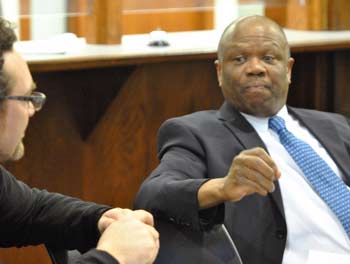
From left: Washtenaw County commissioners Conan Smith (D-District 9, Ann Arbor) and Ronnie Peterson (D-District 6, Ypsilanti). (Photos by the writer.)
The retreat comes in the context of a projected $24.64 million general fund deficit over a four-year period from 2014 through 2017. A much smaller general fund deficit of $3.93 million is projected for 2014, but county administrator Verna McDaniel hopes to identify $6.88 million in structural changes for that year – a combination of new revenues and cuts in expenditures. If that happens, the larger projected deficit would be addressed, because those cuts and revenue increases would compound and carry over into future years.
The retreat didn’t aim to identify dollar amounts or even specific programs to be cut or supported. Rather, the conversation – which included small-group work – was designed to elicit broader priorities of the board. Commissioners did not explicitly reference priorities that had been developed for the previous 2012-2013 budget cycle, though some common themes emerged. [.pdf of 2012-2013 budget priorities]
Several commissioners stressed the importance of strategic investment to create an environment that supports the local economy. Transportation, education, and housing – particularly on the county’s east side, in the Ypsilanti area – were all cited as critical to economic development efforts. Funding strategies were floated, including the possibility of a human services millage, road tax, or “social impact” bond. Also discussed was the possibility of absorbing the road commission into county government operations.
The retreat follows a budget briefing that McDaniel and her financial staff had given to commissioners at their Jan. 16, 2013 meeting. The board has also discussed the budget process at two working sessions earlier in the year, and will follow up the retreat with a working session in April. McDaniel is expected to deliver a budget proposal to the board in September. The board must adopt the budget by the end of 2013.
Retreat Expectations, Framework
At the start of the evening, board chair Yousef Rabhi clarified that although it was a county board of commissioners retreat, he had invited other elected county officials because they work so closely together. [The county board is responsible for setting the budgets that are overseen by other elected officials.] Those “electeds” who attended the retreat included sheriff Jerry Clayton, prosecuting attorney Brian Mackie, treasurer Catherine McClary, clerk/register of deeds Larry Kestenbaum, and Evan Pratt, the county’s water resources commissioner.
Other administrators from the county who attended the retreat included Lloyd Powell, the county’s public defender; county administrator Verna McDaniel; Bob Tetens, director of the county parks & recreation commission; Mary Jo Callan, director of the office of community & economic development, and several other senior staff. Also participating in the retreat was Paul Krutko, CEO of Ann Arbor SPARK, this area’s economic development agency – funded in part by the county. Caryette Fenner – president of AFSCME Local 2733, the county government’s largest union – stayed for the entire retreat but did not participate in the discussions.
The session was facilitated by Mary O’Hare, who began by asking commissioners to state the outcomes they’d like to see from the evening. Several commissioners indicated that they wanted to emerge from the retreat with concrete action items.
Rolland Sizemore Jr. noted that this would be his third budget retreat – joking that aside from Ronnie Peterson, he was now the “old guy” on the board. He hoped to get something done, since many times meetings like this just result in plans that are put on the shelf.
Alicia Ping agreed. She hoped the board would leave with something “actionable.” Sometimes the board develops a “40-word run-on sentence” about what it wants to do, she said, “and we never do any of it.” She’d rather see some quick wins, with actions that can have an immediate impact. She’d rather be able to emerge from the retreat with a few small items that can be tackled, rather than “overarching, grand ideas.”
Dan Smith joked that his goal was to be home and in bed by 10 p.m. He agreed with other commissioners about the need to focus on concrete actions that are within the board’s purview – items that could be brought to the board for a vote within the next year to 18 months. If commissioners simply sit around and talk about things, but never bring anything forward for a vote, then “it really hasn’t accomplished much,” he said.
Yousef Rabhi pointed out that input from this retreat will help guide the task force that’s developing the county’s 2014 and 2015 budget. So in that way, he said, the direction given by the board at this retreat will result in priorities reflected in the budget, which the board will approve later this year. The task force includes senior administrative and finance staff, as well as department heads and two commissioners – Rabhi, who serves as board chair, and Felicia Brabec, chair of the board’s ways & means committee.
Kelly Belknap, the county’s finance director, was asked to provide some context for the budget discussions. She noted that setting the budget is one of the board’s biggest responsibilities, and the staff looks to the board to help set the budget’s priorities. Many services are mandated by the state, but the board can prioritize the level of service that the county should provide above the minimum mandates. The board’s priorities will become part of a “toolkit” that each county department receives as it prepares its piece of the budget and business plan, Belknap explained.
For the next two hours, commissioners and other elected officials and staff broke up into small groups focused on six key areas: (1) labor force sustainability/internal equity; (2) environmental impact and mobility in Washtenaw County; (3) economic development; (4) human services/safety net; (5) mandated service provision/resources; and (6) long-term fiscal stability.
When the group reconvened, they discussed the outcomes of the small group work. This report summarizes that discussion.
Environmental Impact & Mobility
The category of environmental impact and mobility included: issues related to the condition of roads and infrastructure; the county road commission; transportation – both motorized and non-motorized; and parks and open spaces, including the parks & recreation commission.
Andy LaBarre reported out from the small group discussions in this category. The first theme was easy to identify, he said: better roads. He, Dan Smith and Evan Pratt had discussed possible funding strategies, such as taxes – “the T word,” LaBarre joked.
Another theme is to continue expanding non-motorized connections, LaBarre said, and to do both motorized and non-motorized projects in tandem.
Referring to the issue of taxes, Pratt added that “the other party of T is tangible.” The idea is to have a public process that clearly defines what taxpayers will receive if they are taxed at different levels. People agree that roads are in bad shape, but residents need to give input about “the level of pain tolerance,” Pratt said – that is, how much they’re willing to pay in taxes to improve the roads.
Conan Smith raised the issue of consolidating the road commission, saying he wasn’t sure if it was a budgetary issue for this year, but it’s certainly a potential budgetary issue for future years. [Smith was referencing amendments to Section 46.11 of Public Act 156 of 1851, which allows for county boards of commissioners to transfer the powers of the road commission to the county board.] There’s a sunset to that law, he noted. From Section 46.11:
(s) Before January 1, 2015, by majority vote of the members of the county board of commissioners elected and serving in a county with an appointed board of county road commissioners, pass a resolution that transfers the powers, duties, and functions that are otherwise provided by law for the appointed board of county road commissioners of that county to the county board of commissioners.
“If we’re going to have that conversation, we need to have it within the sunset,” Smith said. “If we make that decision, it has budgetary implications – that’s all I’m saying.”
Ronnie Peterson asked Smith if he wanted to add that item to the list of budget priorities, joking that, “We need to stir up something before we leave today. I’m sure I’ll get some phone calls tonight.”
Dan Smith agreed with Conan Smith. They need to start the discussion about whether it makes sense to take over the road commission, he said. “I’m certainly not interested in fixing a problem that doesn’t need it,” Dan Smith added. But they should have that discussion and make a decision, one way or another.
Toward the end of the retreat, Peterson returned to the issue of transportation by raising the topic of regional or countywide transit. He noted that the issue hadn’t been discussed during the evening. LaBarre pointed out that the general topic of transit had emerged, but nothing specifically about the regional transit authority or the countywide effort.
By way of background, the new southeast Michigan regional transit authority (RTA) was created by the state legislature at the end of 2012. Its geographic region includes the city of Detroit and counties of Wayne, Macomb, Oakland and Washtenaw, and is intended to coordinate regional public transportation initiatives. The separate effort to expand transit within Washtenaw County – which involved setting up a countywide Act 196 transit authority last year – was spearheaded by the Ann Arbor Transportation Authority but ultimately did not garner enough support from local municipalities to move forward.
Peterson wanted to put the issue of transit on the table. It’s a major topic of discussion among the county’s urban municipalities, he said. Whatever form it takes, enhanced transit needs to be discussed and the county must play a role in that, he said. “I think people are waiting for us to make a statement.”
Environmental Impact & Mobility: Parks & Rec
Related to the county’s parks & recreation, commissioners highlighted the renewal of a millage for capital improvements that’s expected to be on the ballot in 2014. The board should also think about how to “recharge” the parks & recreation commission for the next generation, LaBarre said. He noted that there are some “long-time champions” on the parks & rec commission who will likely be leaving, so the county board – which appoints the parks & rec commissioners – needs to be thinking about how to cultivate new members.
Conan Smith suggested that the parks & recreation commission needs to have that “longevity” conversation itself. [Smith is one of three county commissioners who also serve on the 10-member parks & recreation commission. Other county commissioners on WCPARC are Dan Smith and Rolland Sizemore Jr.] It’s an awkward conversation to have, Smith noted. A lot of great people have been there for more than 30 years, he said. “If they love the parks commission, they have to be concerned about its viability over the long-term just as much as we are.” He felt that if the parks commissioners address the issue, they might come up with helpful ideas.
Environmental Impact & Mobility: Other Appointed Commissions
Ronnie Peterson asked if the same type of conversation about succession planning should take place at the county road commission. [The commission is composed of three road commissioners, who are also appointed by the county board. One of them, Fred Veigel, has served since 1991, and also serves on the parks & recreation commission. Other road commissioners are Doug Fuller, appointed in 2008; and Ken Schwartz, appointed in 2011 after losing his 2010 re-election bid for the District 2 seat on the county board.]
Peterson framed his comments in terms of the services the state has asked or mandated that local governments to deliver. Some of the appointed county commissions – like the road commission or parks & rec commission – directly oversee the delivery of services, he said, with fewer resources from the state and county. Ultimately, the elected board of commissioners has responsibility. Peterson noted that some appointed commissions haven’t reported back to the county board in more than a decade – if at all.
Some of these appointed commissions might not serve their purposes anymore, Peterson said. It’s important to ask “what should county government look like” in the coming years, he said, especially as employees have been asked to work for less compensation than in the past. The county needs to be more thoughtful about how it designs programs equal to its revenue, he said.
Conan Smith responded, saying that Peterson’s comments tie in to discussions that the board has had about the need to look at the number and structure of its appointed boards, commissions and committees, and about how to make those groups more effective.
Andy LaBarre, who chairs the board’s working sessions, committed to putting that issue on the agenda for a working session later this year.
Smith also raised the challenge of providing sufficient staff resources to support the work of appointed boards and commissions. He said he’s served on many boards and committees over the years, and “to be on a board that has no resources, that has no staff support, is a waste of my time.” So the county needs to think about how to effectively provide resources to its appointed boards and commissions, so that those groups can achieve the missions they’ve been charged with.
Yousef Rabhi said that’s why he appreciated the comments that Peterson had made during the March 6, 2013 county board meeting the previous night, regarding the county’s food policy council. [Rabhi, who serves on that council, had mentioned the possibility of asking the board for funds to hire staff support for the council's work. Peterson had raised concerns, indicating that he wanted to have a broader discussion – possibly at a working session – to develop a process for funding projects that other commissioners might want to bring forward.]
Many commissioners agree that it’s important to find a way to fund the work of these appointed entities, Rabhi said, but it’s important to do that fairly.
Smith suggested tackling it in a phased approach. The board doesn’t have to do it all at once, he said, but it’s important to have a strategy in place and a way to implement that strategy. “Phasing is fine with me,” he said. “The absence of a strategy and absence of resources is not fine.”
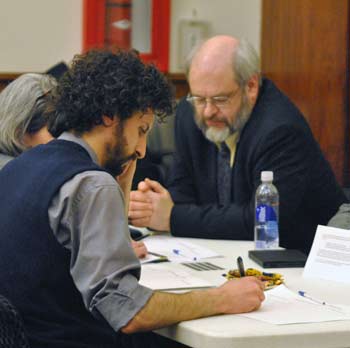
In the foreground is county board chair Yousef Rabhi (D-District 8), at the table with county clerk Larry Kestenbaum.
These issues also incorporate the idea of public engagement, Rabhi said, and how the county works with citizens to engage in policymaking that is ultimately the county board’s responsibility. The food policy council, for example, includes citizens from the community who’ve been appointed to develop policy recommendations for the board. That model can apply to all of the other service areas, he said. “It’s a way to engage citizens in the decision-making process, and there’s a lot of power to that.”
As part of that process, there needs to be a built-in way of reporting the work of these commissions and committees, Rabhi said. For example, these entities need to provide minutes of their meetings by posting them online and making them available to the public. All of these things need to be part of the discussion on building a more engaged public, he said.
Peterson cautioned against creating too many appointed entities, saying that he agreed with some conservatives who believe there’s “too much government within government.” In some cases, the work of these appointed entities might be more appropriately integrated into the work of county departments. “Sometimes you wonder ‘Why are they there?’” he said, referring to the appointed entities.
Economic Development
Yousef Rabhi reported on the small group work for the category of economic development, highlighting some commissioners’ interest in investing in the east side of the county. Issues included the role of government in job creation, as well as providing stable schools and adequate infrastructure. Also discussed was the idea of investing in people or in an environment that supports business, rather than investing in specific projects.
Alicia Ping elaborated, saying that the last item was a direct reaction to Ypsilanti’s Water Street project. [In the late 1990s, the city of Ypsilanti took on millions of dollars in debt to buy and prep about 38 acres of blighted property off of Michigan Avenue, next to the Huron River, for redevelopment that has not materialized. The county parks & recreation commission is working with the city possibly to build a new recreation center on part of that site.]
Instead of investing in projects like the Water Street development, Ping said, the idea is to invest more broadly to build an environment that creates jobs, as well as a workforce that can fill those jobs. “How can we be the catalyst for that – not the creator, but the catalyst?” she asked. That might mean investing in infrastructure, for example. As she has observed in the past, Ping noted that in some areas of western Washtenaw County, no high-speed wireless Internet service is available, and people can’t work from home. As another example, Ping pointed to the county’s Seeds for Change initiative, to provide job training in the food sector in partnership with Washtenaw Community College. How can the county do that same kind of thing for others, she asked – not just people who are dislocated from their job, but also for people who are trying to plan for their future? How can the county help facilitate that type of education to develop the local workforce?
Rabhi felt that this kind of workforce development connected to the conversation about mobility. Transportation is a barrier, too – because maybe the jobs aren’t located near where people are living, he said. Another issue raised during the small group work in the category of economic development was affordable workforce housing. “If the jobs aren’t where people are living, how do we create housing for people where the jobs are?” he said. So maybe part of the solution is transportation, and part of it is workforce housing, Rabhi said.
Another economic development issue raised was the Ypsilanti area school system. Conan Smith elaborated, saying the discussion had revolved around what the county can do to create an environment for investment in places where “it’s most systemically impactful for that investment to happen.” Regarding the Ypsialnti area schools, Smith described it as a big issue that needs a holistic discussion at the board level.
There are two systemic problems on the county’s east side, he said. The employment issue is a serious challenge. “You cannot have a prosperous, sustainable community with the levels of unemployment that you see over on the east side,” Smith said.
There’s also the question about the ability of government to provide basic services, if it’s not generating the revenue necessary to sustain those services. That all comes down to the market for property – especially residential property – in the Ypsilanti area. “Right now there’s no market, and property values continue to decline on the east side,” Smith said, so property tax revenue continues to fall. “If we want to change that dynamic, we have to change the competitiveness of the housing market,” he added, as well as the competitiveness of the commercial and industrial markets.
One strategy for improving the competitiveness of the housing market would be to improve the quality and competitiveness of the school system overall, he said, but also to present a compelling reason for someone to compete for housing in that area. By looking at the school system and the opportunity for children there, Smith said he thinks both issues could be addressed.
Smith suggested expanding the Perry Preschool in Ypsilanti, noting that it was recently touted on This American Life as the nation’s signature pre-K program. Access to that program could be expanded throughout the Ypsilanti school district, he said, which also serves a social service function. There are a lot of parents at or below the poverty level who struggle for childcare services, he said, which creates a barrier for them to go to work. Even when jobs are available, childcare can sometimes be an obstacle.
Smith suggested tying together that pre-K effort with a universal college education component, which could be accomplished through “Promise Zones” or other methods. It creates incentives for current parents in the school district who are sending their kids elsewhere – to charter schools or schools of choice, for example – to bring their kids back into the Ypsilanti area district. He said there are about 2,000 students who fit that category, or about $14 million in state funding that the district isn’t receiving. Creating an incentive for those students to return would help increase revenues to support the quality and sustainability of the school district, he said.
What if living on the east side gives you the opportunity to send your kids to a nationally-known preschool program – and is coupled with the chance to send them to a renowned post-high school institution? Smith ventured that “has to make you think twice when moving to Washtenaw County about choosing that as the place to live and invest – which transforms the market around housing. I think it’s one of the most systemic projects and strategies we could spend some time on.”
By way of background, Smith had made a formal presentation to the board on the issue of revitalizing the county’s east side at a Dec. 7, 2011 board meeting. Smith, who served as board chair at the time, suggested a range of strategies, including the possibility of putting a new countywide millage or Headlee override on the ballot in 2012 to raise revenues. The board did not pursue his proposal.
There is also a county connection to the new Ypsilanti Community School District – a consolidation of Ypsilanti and Willow Run districts. Tony VanDerworp, the county’s economic development officer, is a board member of the new consolidated district.
Human Services/Safety Net
In the category of human services, access to mental and public health services was identified as a priority. That access might be related to transportation, as well as program availability and capacity to serve all those in need.

Greg Dill, Washtenaw County’s infrastructure management director, talks with county treasurer Catherine McClary.
Ronnie Peterson noted that as the county shifts the location of some of its offices – in part to reduce costs by centralizing operations – in some instances it becomes more challenging to meet the needs of clients, he said.
Alicia Ping described a concept of taking county services “on the road.” Like a bookmobile, the county’s public health department could have one mobile point of service, which would make stops throughout the county – in Manchester, Chelsea, Whitmore Lake and other locations, staying at each spot for a few days. That way, she said, people who have transportation challenges could more easily get access to these services.
Conan Smith elaborated on the issue of program capacity: Does the county have enough employees to provide the services that residents need?
The other thing that stood out in the notes from these small group discussions, Smith said, is the need for innovative or new financial tools to meet these challenges – a millage, bonding or tax increment financing. Catherine McClary added that the phrase “financial tools” might not be direct enough. The suggestion was for a human services millage, she noted. Smith agreed, adding that another tool could be a “social impact” bond.
Another theme from this category was to focus on the welfare and root causes of issues related to human services. The idea is to make a “more front-end investment,” Smith said.
A final concern that emerged from the small group work related to the impact of external factors on the county’s ability to provide services. For example, what happens if federal sequestration continues? What happens in a prison-privatization scenario, with possible increases in recidivism and its impact on the county?
Mandated Service Provision/Resources
The category of mandated services focused on serviceability levels and the board’s responsibility for providing mandated services. Felicia Brabec reported out from the small group work in this category, noting that the main theme centered on revenue, which relates to the levels of service that the county can afford.
Conan Smith argued that state-mandated service levels should be interpreted at the “absolute possible minimum.” Beyond that, every other dollar should be invested strategically, he said. That might mean investing in higher levels of service for those services that are mandated. But he indicated that levels of serviceability should be a county board decision, not one made by the state. “I don’t give a crap about what the state tells me to do anymore; they clearly don’t have the prosperity of my community in mind.” He joked that his wife “will probably beat me up when I get home” because of that statement. [Smith is married to state Sen. Rebekah Warren.]
Catherine McClary said there’s a need to have a public discussion about what loss of services the community is willing to tolerate. Yousef Rabhi reported a comment that sheriff Jerry Clayton had made during the small group discussion. Clayton had said that from a pragmatic standpoint, he would deal with whatever budget the county board gave the sheriff’s office. But a cut in the budget means a cut in services. So the board needs to weigh its priorities when making cuts, Rabhi said.
Dan Smith noted that budget cuts quickly become a “complex piece of machinery.” The board could define the bare minimum mandate for the register of deeds office, for example. Perhaps that means it’s open only four hours on Monday morning, he said. But the potential repercussions might be that it becomes very difficult to buy and sell property in Washtenaw County – so the backlog of paperwork grows and closing on a new house takes a lot longer. That would hurt economic development, he said. His point was to illustrate how complex and interrelated these services are.
Continuing the example of the register of deeds, Rabhi added that this kind of work needs to be done – and it would just take longer, if fewer resources exist to do the work. McClary elaborated, saying that if the county has a furlough day and its offices are closed, people could make payments to the county through their banks. But if those payments aren’t being processed by the county in a timely way, the money isn’t going into the county’s accounts. So there are external issues related to economic development, but also internal issues related to the county’s fiscal stability. The example that Clayton gave, McClary reported, is whether the county will tolerate a five-minute response time from the sheriff’s office, or is 10 minutes good enough, even if someone is injured?
Dan Smith noted that if you reduce those mandated levels of service in public safety and justice, then crime might increase. He said he understands Conan Smith’s point, “but when you start tweaking those dials, the unknown ramifications quickly start to come forward.”
Conan Smith said his point about mandates wasn’t to suggest that the current levels of service should be reduced. Rather, he said he doesn’t want the state’s mandate to drive the county’s decision-making process about appropriate investments. “Let’s sideline that as much as possible,” he said. Instead, the question should be asked from the county’s perspective: “What is our desired serviceability level, as opposed to what the mandate is?”
Dan Smith pointed out that it’s a very hard discussion to talk about what levels of serviceability should be above the bare minimum mandate. Conan Smith agreed, adding that “I think we should have those hard discussions.” Especially if the board decides to move to a four-year budget process, then commissioners need to have these hard discussions this year, he said.
Andy LaBarre summarized Conan Smith’s point this way: By minimizing the definition of what’s mandated, the county maximizes its flexibility.
Collaboration was another theme identified in this category, Brabec said. An example cited was a software system that’s being used by both the treasurer’s office and the clerk/register of deeds, which helps link departments and cut costs.
Labor Force Sustainability/Internal Equity
Alicia Ping described the small group discussions for the category of labor force sustainability and internal equity. She reported a suggestion to do a compensation study using an organization like the Michigan Municipal League, which is based in Ann Arbor. Another suggestion is to look at part-time contractual workers as an option, but not a long-term solution. Also, the idea was raised to focus on succession planning and training the workers of the future.
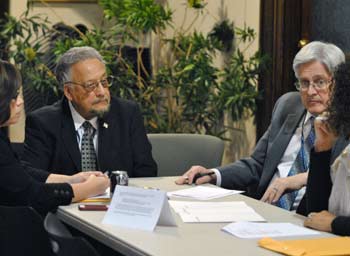
From left: Washtenaw County public defender Lloyd Powell and Brian Mackie, the county’s prosecuting attorney.
Yousef Rabhi described the succession planning as a contrast to the model used by Lloyd Powell, the county’s public defender. In the public defender’s office, Rabhi said, young people are coming there to get experience. The idea is that it’s fine to provide experience for entry-level workers, but that approach shouldn’t be used to replace full-time staff, he said.
Ping reported that other ideas from the small group work included the need to update the county’s nepotism policy, and to restore the county’s commitment to professional and educational development. Another suggestion was to maintain the size of the county’s staff.
Conan Smith elaborated on that last point, saying he believed the county had already cut its capacity so severely that maintaining current staff levels ought to be a priority. Further reductions would result in community impacts that aren’t acceptable, he said.
Dan Smith noted that it’s important to keep in mind the cost of an employee, but also the value that taxpayers get as the result of having that person employed. The board needs to craft policies and make budget decisions so that “we continue to get high value for our expenditure,” he said. For example, if the organization becomes a training ground for people, where workers stay for 3-5 years then move on to something else, it’s great for the employee but perhaps not so good for the county, he said. In that scenario, the county is spending taxpayer dollars constantly educating employees, compared to a situation where an employee stays for a career with the county. “Finding the right balance is difficult,” Smith said.
Rabhi pointed out that turnover is also a factor. The county needs to compensate its employees adequately to attract and retain people who are valuable and who can provide good services to residents. Dan Smith noted that the county has a lot of skilled employees with a lot of experience who deliver high value for what they’re being paid. “That’s a great taxpayer benefit,” he said.
Conan Smith said he was interested in expanding a compensation study to also encompass staff motivation. You don’t pursue a career in government with the intent of becoming a millionaire, he said. Your motivation is usually more social – the desire to have an impact on the community, to be a civil servant, he said. So how can the county create an environment where that motivation stays high, and people don’t want to leave? Some of that is the compensation structure, he said, but some of it is “How awesome is my job? Am I making a difference that matters to me?”
Dan Smith said it’s easy for boards – whether in government or private corporations – to think that money and compensation are the solution. It’s an easy solution to put in place, he noted, but it really papers over problems because the underlying problems don’t go away.
Rabhi added that it relates to equity, too. If you don’t feel you’re being treated fairly, then that makes your job more miserable. A compensation study would help flesh out some of these issues, he said.
Ronnie Peterson urged that rank-and-file employees should be involved in designing the study, and should be part of any discussion about what it would take to entice employees – both to join the organization, and to stay there. Right now, employees have sacrificed and have shown commitment by staying, despite the sacrifices, he said. Years ago, employees sought out the county because of its reputation, he said. How can the county recreate that environment, even as a smaller organization? Employees are public servants, not public slaves, Peterson said. Employees should be fairly compensated for their labor.
Long-Term Fiscal Stability
Reporting on the category of long-term fiscal stability, Alicia Ping identified the common theme from the small group discussions as information. Commissioners want more information, she said, including information related to the impact of federal sequestration cuts and general trend data.
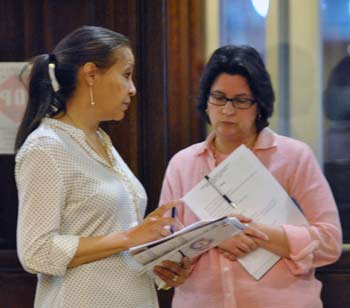
From left: County administrator Verna McDaniel talks with Mary O’Hare, who facilitated the board retreat.
There was also some interest in developing different versions of the upcoming budget, based on different revenue assumptions.
When looking at the economy, Dan Smith noted that it’s been an interesting 5-6 years, or even decade, and most people agree that it’s been a once-in-a-lifetime experience. The question is: What’s the future going to look like? In developing a budget, does the county make projections more in line with the long-term historical past? Or do they project a future based on very conservative assumptions? Both approaches have implications for the budget, he said. Smith said he doesn’t know what the answer is, but those decisions will have a compounding effect on the budget.
Conan Smith felt that the county’s finance team has been keenly focused on the county’s long-term fiscal stability. What the board needs to do is to focus on community impacts that result in long-term sustainability and stability. They could take a conservative fiscal approach and focus on things that they can control, like the county’s budget, he said. They can control costs and not make structural investments that result in long-term, compounding costs. In contrast, other actions could be more risky, he said, but might offer a different community and fiscal impact – like investing in improvement of the county’s property value base. Over the long-term, it could result in the restoration of prosperity and property values.
Smith said the county doesn’t control the market, but the board ought to have a discussion about what the county can work to influence. Right now, economic development is not a primary focus for the county programmatically, he said, but he felt it’s an area that should receive increased attention, in terms of the investments that the county is making. For some county employees who are leading current programs, it might mean a wholesale revamp of how they do business. It goes back to investing in root causes instead of immediate pain, Smith said. Instead of putting a band-aid on a wound, the goal is to make sure the wound never happens. Those are tough decisions to make, but the board is doing a disservice to the community if it’s not at least having a conversation about these issues.
Next Steps
Mary O’Hare wrapped up the retreat by telling commissioners that the discussion would be summarized and provided to them, to use as they continue setting priorities. Andy LaBarre, chair of the board’s working sessions, reported that a working session on April 4 is scheduled as follow-up to the retreat.
Ronnie Peterson wanted to know how this process falls in line with the board’s existing budget timelines. He noted that there’s some urgency with this, as the board works to develop the 2014-2015 budget.
County administrator Verna McDaniel reviewed the timeline and guidelines that the board had adopted at its Jan. 16, 2013 meeting. [.pdf of timeline and guidelines] That timeline includes:
- March-April: Budget preparation with county finance staff and organization.
- April: 2013 equalization report delivered to the board.
- May: Board leadership gets budget development update; full board gets revised financial State of the County presentation.
- May-June: Meetings with administration, finance and organization to review all options & define budget targets.
- June: Board leadership gets budget development update.
- July-August: Development of administrator’s recommended budget.
- August: Board leadership gets budget development update, and board holds preliminary budget review sessions.
- September: Presentation of administrator’s recommended budget.
- Sept.-Oct.: Deliberation on budget at Ways & Means Committee meetings.
- October: Public hearing on budget.
- November: Board adopts budget.
McDaniel noted that the board chair, Yousef Rabhi, as well as Felicia Brabec, chair of the board’s ways & means committee, are both members of a budget task force that includes key staff and administrators.
Conan Smith suggested holding a working session at some point about potential millages. He noted that the issue of revenue was mentioned during the retreat in connection to several areas. If the board is considering a millage in 2013, they need to have that discussion fairly quickly, because there’s a statutory timeframe for putting a millage on the ballot. More importantly, he added, is the need to build up public will for a millage. Maybe there’s not the will to have that conversation, Smith said, but he did want to raise the issue.
Peterson noted that some of these issues are political decisions, and should be separated out – like whether to seize control of the road commission, he said. Another example is whether to support expanded public transit, he said. These issues don’t need to be tied to the budget timeline. He felt that the board might need an extra meeting to deal with these broader questions.
The economy is rebounding, Peterson said. Ann Arbor and some other communities are doing extremely well, although the east side of the county is still hurting. He said the board needs to schedule at least one more session to talk about these issues.
Rabhi agreed, suggesting that they devote future budget sessions to specific topics, like transportation. He said he appreciated the dialogue that they’d had during the retreat. It’s important to take a step back and ask what they’d like the county to look like, he said. It’s not a question they can answer in one night, but it’s something they should keep in mind as they go through the budgeting process.
Present: Felicia Brabec, Andy LaBarre, Kent Martinez-Kratz, Ronnie Peterson, Alicia Ping, Yousef Rabhi, Rolland Sizemore Jr., Conan Smith, Dan Smith.
Next regular board meeting: Wednesday, March 20, 2013 at 6:30 p.m. at the county administration building, 220 N. Main St. in Ann Arbor. The ways & means committee meets first, followed immediately by the regular board meeting. [Check Chronicle event listings to confirm date.] (Though the agenda states that the regular board meeting begins at 6:45 p.m., it usually starts much later – times vary depending on what’s on the agenda.) Public commentary is held at the beginning of each meeting, and no advance sign-up is required.
The Chronicle could not survive without regular voluntary subscriptions to support our coverage of public bodies like the Washtenaw County board of commissioners. Click this link for details: Subscribe to The Chronicle. And if you’re already supporting us, please encourage your friends, neighbors and colleagues to help support The Chronicle, too!




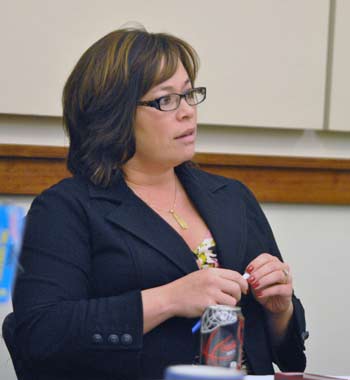
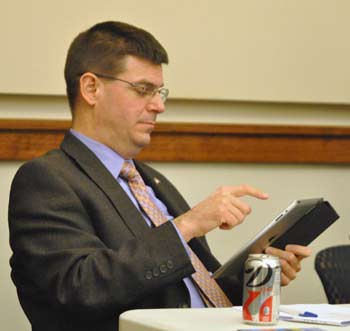

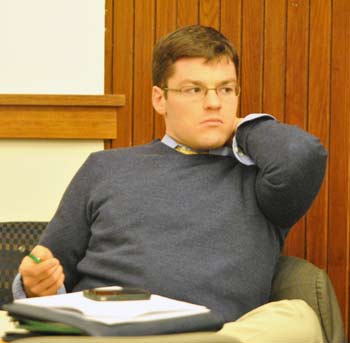
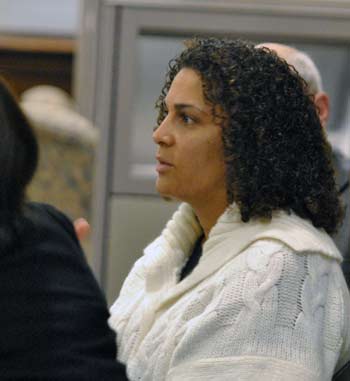
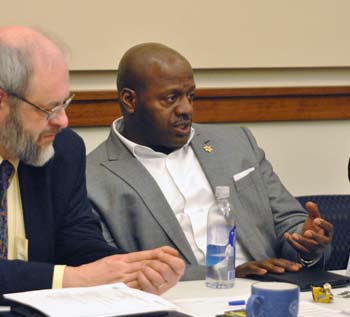
Ms Morgan
As I have come to expect, this piece was informative, useful and readable. Thank you for your continued excellent coveage.